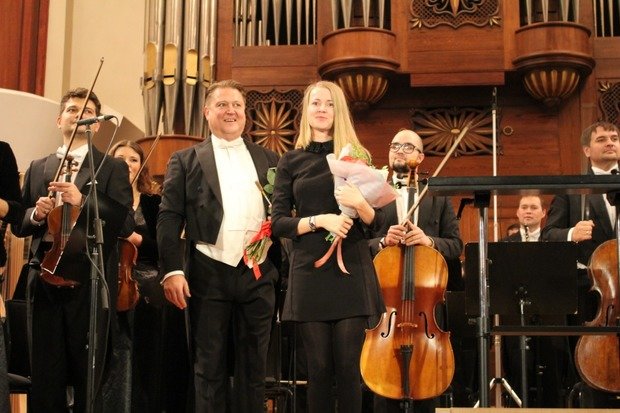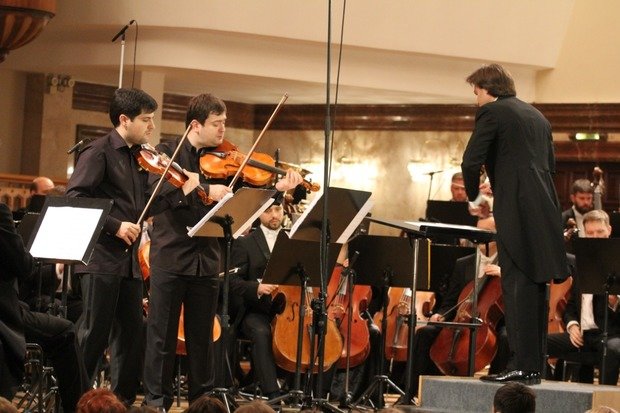Tatarstan Symphony Orchestra 'achieves balance'
Concordia international festival continues in Kazan
The third concert of the Sofia Gubaidulina International Concordia Contemporary Music Festival has recently been held in the Saydashev State Great Concert Hall in Kazan. Again in its framework the world premiere of a work and the first three performances of works in Kazan have been performed. Read the details in the material of Realnoe Vremya.
For harmony
Anna Pospelova, a young Moscow composer, graduate of the Moscow Conservatory, brought her work written in 2012 to Kazan, for some reason not performed earlier. Anna called it Equilibrio, which translated as ''Balance''. Pospelova is the finalist of the contest of young composers Drugoe Prostranstvo, where the jury presented works for symphony orchestras.
We can assume that by inviting Anna Pospelova with her work to participate in the international festival Concordia, artistic director of the festival, chief conductor and artistic director of the Tatarstan National Symphony Orchestra Alexander Sladkovsky rightly decided to give the floor to the young generation of composers, the generation that was formed creatively in the new century. He himself conducted the orchestra during the performance of the work of Pospelova, and this, unfortunately, was the only appearance of the maestro on the stage that day.
The fifteen-minute work by Anna Pospelova, as interpreted by Alexander Sladkovsky, is a kind of pendulum. It swings from despair to hope, from light to darkness, from evil to good. At some point, the balance is achieved, that is harmony. It's fragile, easy to destroy, but it's there. The search for harmony, its difficult finding — this is one of the permanent themes in the work of Alexander Sladkovsky.
Pospelova's music is complex and simple at the same time, it will be clear if you take its figurative system, which is so clearly demonstrated by the Tatarstan Symphony Orchestra, led by the maestro along this difficult path.

The Polish act
Alexander Sladkovsky was followed by conductor Gavriel Heine, an American by birth, but a graduate of the Moscow Conservatory, who then trained at the St. Petersburg Conservatory and was one of the last students of legendary Ilya Musin. Heine is one of the leading conductors of the Mariinsky Theatre, and as a guest conductor he collaborates with many of the world's leading orchestras.
In addition to the world premiere of Anna Pospelova, the programme of the concert included the music of two pillars of modern Polish symphonism — Krzysztof Penderecki and Witold Lutosławski. The first, by the way, a year ago toured Kazan at the invitation of Maestro Sladkovsky.
Lutosławski's Concerto for Cello and Orchestra, written by the order of the Royal Philharmonic Society, was dedicated to Mstislav Rostropovich. The composer during his writing often turned to the musician for advice, so the rebellious spirit of Rostropovich, who loved to break the canons, as if concluded in this concert, written in a complex musical language. By the way, this composition by Witold Lutosławski was often performed by Rostropovich.
At the concert, the cello part was performed by Anastasia Kobekina. Certainly, it is both difficult and responsible to solo in the performance of the work dedicated to Rostropovich himself. But Kobekina, the winner of numerous international competitions, nevertheless demonstrated a very fine intellectual game. Lutosławski's Concerto has been performed in Kazan for the first time.

The Kazan audience heard two more interesting musicians during a double concert for violin and viola by Krzysztof Penderecki. These are Mikhail Pochekin (violin) and Ivan Pochekin (viola) — representatives of the young, but already loudly declared themselves generation of violinists.
The concert by Penderecki, written for the anniversary of the Vienna Wiener Musikverein (where, by the way, some time ago the Tatar State Symphony Orchestra and Maestro Sladkovsky successfully toured), is both a dialogue and a musical duel of two instruments. Bright, imaginative, exciting. As, however, all the music of this Polish classic of the new age. The concert of Penderecki has also been performed for the first time in Kazan.
Finally, an unusual, which can be compared, if we remember the fine arts, with the works of Alexander Rodchenko and Barbara Stepanova. This was the symphonic episode The Plant. The music of Machines by Alexander Mossolov first performed in Kazan at the concert. This musical constructivism, when the orchestra musicians are like parts of a giant machine. Not terrible Kuprin's Moloch, but something rhythmic and even fascinating.
The third concert within the framework of Concordia was conceived by the artistic director of the festival obviously as a kind of dialogue between generations. Different generations of people but who speak the same language. The Tatar State Symphony Orchestra made this language understandable to the public.